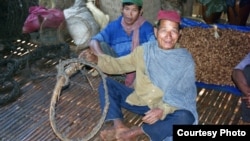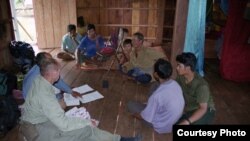Experts on indigenous minorities and Vietnam War veterans will meet in North Carolina early next year to discuss challenges facing the Montagnard highland community in the United States and Southeast Asia.
The one-day conference will be held Feb. 3 at the University of North Carolina-Wilmington in Wilmington N.C., organizers said.
During the Vietnam War, the Montagnards – a term used to call a member of any various hill-dwelling people of Southeast Asia, especially those inhabiting the highlands of Vietnam – often worked with the U.S. military.
“We owe them a debt of gratitude,’’ said Peter Maguire, an American author and historian who is helping organize the forum through his Fainting Robin Foundation. ‘’They, particularly with the American Special Forces ... They saved a lot of American lives.”
Maguire said the Montagnards were “betrayed” and “abandoned” by Washington policy-makers after U.S. forces departed South Vietnam in 1975.
Some 15,000 Montagnards were resettled in the 1990s and 2000s in North Carolina.
"The resettlement of our persecuted allies in North Carolina was a remarkable group effort that drew together people who rarely mix, much less get along,” he said. “Although this effort was very little, very late, it serves as a solemn reminder to Americans of the price paid by those who take us at our word.”
Steve Parker, executive director of Friends of the Central Highlands in the US, a North Carolina-based non-profit organization, said Montagnards living in the United States tended to have a lower socio-economic status than other Asian-Americans.
“Generally, they are fairly industrious people,” Parker said. “They work hard… They don’t generally have problem finding jobs.”
He explained the work they tend to find in the U.S. is not well-compensated.
Some of the Montagnards still believe that they might be able to lead a resurrection for freedom in their home country, according to Parker.
“There are a couple of small political movements that are still hoping that the United States will arm them and send them back to fight a war of liberation for central highlands,” Parker said in a recent phone interview. “I’ve tried to tell them that probably this is not going to happen and they would be better off devoting their resources for some other causes. They are very stubborn and they believe long enough that they can make this happen.’’
The conference will also discuss unwritten language, ancient history, and devastating effects of the Vietnam War on the hill tribes, especially the Bunong, a minority people from eastern part of Cambodia.
“There’s been a big loss of land and that really disrupts the community ties,” said linguist Becky Butler from the University of North Carolina, who will be speaking at the forum. “And when those are disrupted that greatly affects the ability of older people in the community to pass on the language to younger people and that really affect economic opportunity which nowadays is the big driver for language shift because younger people know that if they want to succeed. If they want an opportunity they’ve got to learn a more dominant language, a Khmer or Vietnamese or in the United States, English. So that’s probably the number one driver for their language loss.”
Other panelists scheduled to participate, Maguire said, include members of the Jarai hill tribe, linguist Sylvain Vogel, journalist Kevin Doyle and filmmaker and SE Asia researcher Sara Colm.
Plaing Sin, a Bunong native in Cambodia, said that living conditions of the people in his community has been severely affected since the loss of forest and wildlife. Younger generation doesn’t want to speak their language.
“Our language is losing gradually,” said Plaing Sin, reached recently by phone. “The younger generation like to speak Khmer and don’t want to speak our language. They don’t want to wear traditional clothes anymore. Even dressing up for an art performance makes them feel embarrassed.”
Butler believed the conference can demonstrate a value of indigenous languages, which the government and political entities potentially can recognize, and then begin investing in the well-being of an often marginalized people.
“It’s to the benefit of a nation if they can preserve as much diversity as possible,” Butler said.






